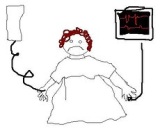May 27th, 2011 by BarbaraFicarraRN in Health Tips, Opinion
No Comments »


Social networking allows doctors, nurses and other health professionals to deeply connect and engage with the community and their colleagues.
“We are standing at the precipice of a new online revolution in health care. As more and more health experts embrace the Internet and increase their social media activity, health information seekers will undoubtedly benefit in profound ways.” [Source: Mashable]
Dynamic health and medical professionals engaged in social networking, using Twitter, Facebook, Blogs and YouTube are on the front-line of new modern medicine.
Today’s modern medicine is all about the patient. Participating, partnering and developing a professional relationship is paramount.
While many health consumers are searching the web for support, reassurance and specific health news and information; doctors and nurses continue to question the value of the internet for patients.
Social networking sites such as Twitter, Facebook, and Blogs are not a waste of time for health professionals because it offers value.
Social networking sites and blogs are a powerful and phenomenal platform to educate patients, raise awareness of health issues and it offers a forum to collaborate and connect. It gives a voice to patients and it allows for the conversation to get started with their doctors and other health care professionals.
Doctors, nurses and other health professionals can help validate what is important for patients.
3 reasons why social networking is not a waste of time Read more »
*This blog post was originally published at Health in 30*
November 10th, 2010 by Dr. Val Jones in Expert Interviews, Opinion, True Stories
No Comments »

Wendy Sue Swanson, MD
Most physicians still don’t see the need to blog, Tweet, or spend time on Facebook. They groan when you ask if they participate on social media platforms. “I’m too busy seeing patients,” they say, “and why would I expose myself to legal risk? Someone might think that I’m giving medical advice, or disclosing personal information about patients online.”
While these fears are pervasive, early adopters of social media like Dr. Wendy Swanson (and yours truly, by the way) have a different view. Not only should physicians become active in social media, but they have an ethical responsibility to do so.
Wendy is a pediatrician, mother, and blogger at Seattle Children’s Hospital. My friend “ePatient Dave” deBronkart recently encouraged me to watch an excellent video of Wendy speaking at the Swedish Symposium 2010 conference. I’d like to summarize Wendy’s pro-social media arguments for you here, with the hope of luring more of my peers to join the conversation online! Read more »
November 2nd, 2010 by admin in Health Policy, Humor, Opinion, True Stories
No Comments »
This is a guest post from Carolyn Thomas:
 An Open Letter To All Hospital Staff
An Open Letter To All Hospital Staff
Dear hospital employees,
After a particularly bizarre experience undergoing a treadmill stress echocardiogram at your hospital recently, I decided to do something that I have never done before: I called the manager of the cardiology department to complain about her staff. (Incidentally, a recent opinion survey of international tourists found that Canadians were #1 in only one category: “Least likely to complain when things go wrong” — so you can appreciate that lodging an official complaint is a fairly big deal here!)
In my best PR fashion, I told the manager how distressing the appointment had been because of the behaviour of the two cardiac technicians in the room. It’s not so much that they were openly rude, but it was their insufferable lack of people skills that had pushed me over the edge. No introductions, no eye contact, no consideration of how awkward this test can be, no explanation of the test procedures or even the flimsiest effort at polite conversation. To them, I was merely the 1:00 o’clock appointment, the obstacle between them and their next coffee break, just a piece of meat on a slab — but worse, an invisible piece of meat. Read more »
July 28th, 2010 by Toni Brayer, M.D. in Better Health Network, News, Opinion, Research, True Stories
No Comments »

 A few weeks before Christmas, Eutisha Rennix, a pregnant restaurant worker, collapsed while working. She started having a seizure and her co-workers were screaming for help.
A few weeks before Christmas, Eutisha Rennix, a pregnant restaurant worker, collapsed while working. She started having a seizure and her co-workers were screaming for help.
There were two EMT workers in line at Au Bon Pain shop in Brooklyn and they refused to help. They told onlookers to call 911 and they walked out of the store after picking up their bagels, presumably because they were on a coffee break. An ambulance was called and the 25-year-old woman and her baby girl died shortly afterward. She is survived by a 3-year-old son. Read more »
*This blog post was originally published at EverythingHealth*
July 23rd, 2010 by Davis Liu, M.D. in Better Health Network, Health Policy, Opinion
No Comments »

 First, I am a big admirer of Apple CEO Steve Jobs for his thoughtful 2005 Stanford commencement speech, his clarity of vision, and his superb skills as a leader. Fortune magazine named him CEO of the decade after turning around the company he founded from near bankruptcy in the late 1990s to becoming the most valued company today. Though I have great respect for him, I haven’t bought an Apple product, ever, until this year.
First, I am a big admirer of Apple CEO Steve Jobs for his thoughtful 2005 Stanford commencement speech, his clarity of vision, and his superb skills as a leader. Fortune magazine named him CEO of the decade after turning around the company he founded from near bankruptcy in the late 1990s to becoming the most valued company today. Though I have great respect for him, I haven’t bought an Apple product, ever, until this year.
So I watched with great interest his press conference regarding Antennagate which has consumed technology news with regards to the design of the new iPhone 4 and its new antenna design. Apparently this makes the smartphone vulnerable to dropping phone calls when held a certain way, known as the death grip. If one simply avoided holding the phone that one explicit way, the phone otherwise worked fine. As a result, 22 days after the latest iPhone was available to the public, Jobs and Apple were instead addressing an issue which dwarfed their latest product launch.
Doctors and patients can learn plenty by watching Jobs’ approach to the problem, because the situation he and his team were tackling is similar to what a doctor addresses daily in the office. Read more »
*This blog post was originally published at Saving Money and Surviving the Healthcare Crisis*







 A few weeks before Christmas, Eutisha Rennix, a pregnant restaurant worker, collapsed while working. She started having a seizure and her co-workers were screaming for help.
A few weeks before Christmas, Eutisha Rennix, a pregnant restaurant worker, collapsed while working. She started having a seizure and her co-workers were screaming for help.











